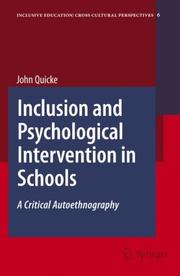| Listing 1 - 9 of 9 |
Sort by
|
Book
ISBN: 1593323115 9781593323110 9781593322311 1593322313 Year: 2008 Publisher: New York LFB Scholarly Pub.
Abstract | Keywords | Export | Availability | Bookmark
 Loading...
Loading...Choose an application
- Reference Manager
- EndNote
- RefWorks (Direct export to RefWorks)
At-risk youth --- Violence in adolescence --- Mental health --- Problem youth
Book
Year: 2008 Publisher: [Washington, D.C.] : U.S. Govt. Accountability Office,
Abstract | Keywords | Export | Availability | Bookmark
 Loading...
Loading...Choose an application
- Reference Manager
- EndNote
- RefWorks (Direct export to RefWorks)
Juvenile detention homes --- Child welfare --- Mental health services --- At-risk youth --- States --- Services for
Book
Year: 2008 Publisher: [Washington, D.C.] : U.S. Govt. Accountability Office,
Abstract | Keywords | Export | Availability | Bookmark
 Loading...
Loading...Choose an application
- Reference Manager
- EndNote
- RefWorks (Direct export to RefWorks)
At-risk youth --- Juvenile delinquents --- Deceptive advertising --- Juvenile detention homes --- Abuse of --- States
Book
Year: 2008 Publisher: [Washington, D.C.] : U.S. Govt. Accountability Office,
Abstract | Keywords | Export | Availability | Bookmark
 Loading...
Loading...Choose an application
- Reference Manager
- EndNote
- RefWorks (Direct export to RefWorks)
At-risk youth --- Group homes for youth --- Institutional care --- States. --- Licenses
Book
Year: 2008 Publisher: Washington, D.C. : U.S. G.P.O. : For sale by the U.S. G.P.O., Supt. of Docs., Congressional Sales Office,
Abstract | Keywords | Export | Availability | Bookmark
 Loading...
Loading...Choose an application
- Reference Manager
- EndNote
- RefWorks (Direct export to RefWorks)
At-risk youth --- Juvenile delinquents --- Deceptive advertising --- Juvenile detention homes --- Abuse of --- Abuse of --- States.
Book
ISBN: 0821375210 0821375202 Year: 2008 Publisher: Washington, D.C. : World Bank,
Abstract | Keywords | Export | Availability | Bookmark
 Loading...
Loading...Choose an application
- Reference Manager
- EndNote
- RefWorks (Direct export to RefWorks)
Youth at Risk in Latin America provides evidence-based guidance to policymakers that will help increase the effectiveness of their youth investment program. Drawing on the authors' detailed analyses, the book describes twenty-three policies and programs that youth development experts agree are the basis of a quality youth development portfolio, from early childhood development programs to parent training to cash transfers for positive behaviors. It also lays out strategies for implementing this effective youth portfolio in a budget-constrained environment by reallocation of resources away from

ISBN: 1281117137 9786611117139 1402063687 1402063679 Year: 2008 Publisher: Dordrecht : Springer,
Abstract | Keywords | Export | Availability | Bookmark
 Loading...
Loading...Choose an application
- Reference Manager
- EndNote
- RefWorks (Direct export to RefWorks)
This book consists of a number of case studies about interventions in schools to promote the inclusion of pupils referred to a local authority Educational Psychology Service (EPS) in the north of England. The aim is to provide accounts which do not shirk from describing ‘failures’ as well as ‘successes’ and which reflect the general ‘messiness’ of this kind of work. They are written as ‘stories’ from the point of view of an educational psychologist who regards himself as a critical reflective practitioner whose professional practice is grounded in a democratic, inclusive philosophy. The methodology of the book draws on the qualitative research tradition in social science and education, in particular ethnography and action research, and makes a unique contribution to the role of ‘storying’ in this kind of research. The author feels that his approach represents a challenge to conventional constraints on research in his own profession which prevent the development of a more open dialogue about the role and purpose of psychological interventions to promote inclusion. The worked examples of practical strategies in mainstream provide insights which should be of interest to all support professionals, teachers, educationalists and others concerned with inclusion of pupils described as having ‘special educational needs’.
Inclusive education --- Students with disabilities --- School psychology --- Students with social disabilities --- Problem youth --- Education --- Functional assessment --- At-risk youth (Social sciences) --- Maladjusted youth --- Troubled youth --- Youth at risk (Social sciences) --- Youth --- People with social disabilities --- Psychology, School --- Psychology, Applied --- Handicapped students --- People with disabilities --- Inclusion (Education) --- Inclusive learning --- Inclusive schools movement --- Least restrictive environment --- Mainstreaming in education --- Youth with behavior disorders --- At-risk youth
Book
ISBN: 1281782246 9786611782245 1846427916 9781846427916 9781281782243 9781843106104 1843106108 6611782249 Year: 2008 Publisher: London Philadelphia Jessica Kingsley Publishers
Abstract | Keywords | Export | Availability | Bookmark
 Loading...
Loading...Choose an application
- Reference Manager
- EndNote
- RefWorks (Direct export to RefWorks)
The transition from care into adulthood is a difficult step for any young person, but young people leaving care have a high risk of social exclusion, both in terms of material disadvantage and marginalisation. In Young People's Transitions from Care to Adulthood leading academics gather together the latest international research relating to the transition of young people leaving care, outlining and comparing the range of legal and policy frameworks, welfare regimes and innovative practice across 16 countries. The book also highlights the variations that exist between different groups leaving c
Young adults --- Youth with social disabilities --- Youth --- Young people --- Young persons --- Youngsters --- Youths --- Age groups --- Life cycle, Human --- At-risk youth (Social sciences) --- Socially handicapped youth --- Youth at risk (Social sciences) --- People with social disabilities --- Youth with disabilities --- Adulthood --- Services for. --- Institutional care.

ISBN: 0814720366 0814785212 8147203667 9788147203669 9780814719916 0814719910 9780814719923 0814719929 9780814785218 9780814720363 Year: 2008 Publisher: New York, NY
Abstract | Keywords | Export | Availability | Bookmark
 Loading...
Loading...Choose an application
- Reference Manager
- EndNote
- RefWorks (Direct export to RefWorks)
Teens in America's inner cities grow up and construct identities amidst a landscape of relationships and violence, support and discrimination, games and gangs. In such contexts, local environments such as after-school programs may help youth to mediate between social stereotypes and daily experience, or provide space for them to consider themselves as contributing members of a community. Based on four years of field work with both the adolescent members and staff of an inner-city youth organization in a large Midwestern city, Pride in the Projects examines the construction of identity as it oc
After-school programs --- Interpersonal relations --- Youth with social disabilities --- Urban youth --- Identity (Psychology) in adolescence --- After-school education --- Afterschool programs --- Education --- Human relations --- Interpersonal relationships --- Personal relations --- Relations, Interpersonal --- Relationships, Interpersonal --- Social behavior --- Social psychology --- Object relations (Psychoanalysis) --- At-risk youth (Social sciences) --- Socially handicapped youth --- Youth at risk (Social sciences) --- People with social disabilities --- Youth with disabilities --- City dwellers --- Youth --- City children --- Adolescent psychology --- Psychology --- Based. --- Pride. --- Projects. --- adolescent. --- both. --- city. --- construction. --- context. --- emphasizing. --- examines. --- field. --- formed. --- four. --- identities. --- identity. --- inner-city. --- large. --- local. --- members. --- mid-western. --- occurs. --- organization. --- relationships. --- staff. --- this. --- which. --- with. --- within. --- work. --- years. --- youth.
| Listing 1 - 9 of 9 |
Sort by
|

 Search
Search Feedback
Feedback About UniCat
About UniCat  Help
Help News
News